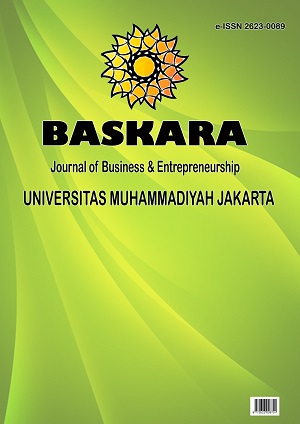Islamic Economic Methodology Aproach to Achieve Economic Equity: Epistemological Study
DOI:
https://doi.org/10.54268/baskara.v4i2.12189Keywords:
Islamic Economics, Economic Equity, Epistemological StudiesAbstract
Economic policies based on capitalism and socialism have proven to have failed to create a just economy. As a result of adhering to capitalist and socialist ideologies, macroeconomic imbalances and national instability occur. The welfare and prosperity of the people does not depend on production alone, but also on its proper distribution. Wealth in a country can be produced in large quantities, but if its distribution is not based on true and fair principles, then the country will not be able to achieve prosperity. This article aims to find out how the methodology of Islamic economics realizes equity and falah. This research uses descriptive qualitative research method with a literature review approach. Data collection techniques, with literature, from several sources obtained that are relevant to the theme. Books, journals, websites, and others. The data analysis technique is descriptive qualitative, describing the study of Islamic economic epistemology that can help realize economic equity. The results in this study BMT is a financial institutional system that is able to reform the conventional economic system and bring economic justice and equitable distribution with practical provisions through syar'i arrangements in collecting and distributing through wadi'ah, mudharabah, musyarakah, murabahah, salam, istishna transactions. , ijarah, and qardh. The implementation of Islamic social finance in Indonesia can be seen through the existence of various financial institutions that provide financial services by involving Islamic social funds such as Baznas (National Amil Zakat Agency), BWI (Indonesian Waqf Board) and other institutions with the aim of embracing the middle, small, and medium-sized micro communities.References
Mahri. W, Jajang. A dkk (2021). Ekonomi Pembangunan Islam. Jakarta : Departemen Ekonomi dan Keuangan Syariah – Bank Indonesia.
Abdul Qoyum, A. F. S. N. (2021) Sejarah Pemikiran Ekonomi Islam, Departemen Ekonomi dan Keuangan Syariah – Bank Indonesia.
Astuti, M. (2017) ‘Konsep Pemerataan Ekonomi Umar Bin Abdul Aziz (818 M-820M)’, At-Tauzi’ : Jurnal Ekonomi Islam, 17(2), pp. 141–155.
Ibrahim, A. et al. (2021) Pengantar Ekonomi Islam.
Iswanto, B. (2019) ‘PENDEKATAN BUDAYA LOKAL: MENINGKATKAN PEREKONOMIAN DAN TATANAN SOSIAL MASYARAKAT PERBATASAN (dalam Perspektif Ekonomi Islam)’, BASKARA: Journal of Business and Entrepreneurship, (4), pp. 13–20. doi: 10.24853/baskara.2.1.13-20.
Mossy, J. L. B. and Arsyad, A. L. L. (2019) ‘Pertumbuhan Dan Pemerataan Ekonomi, Perspektif Ekonomi Syariah’, Amal: Jurnal Ekonomi Syariah, 01(02), pp. 206–230. Available at: https://www.jurnal.iainambon.ac.id/index.php/amal/article/view/1258/0.
Muh. Yunus Shamad (2017) ‘Epistimologi Ekonomi Islam dan Dikotomi Ilmu Ekonomi Islam’, Istiqra’, 4(2), pp. 182–188.
Muhammad, P. (2020) ‘Keadilan dan Pemerataan Ekonomi Melalui Konsep Baitul Mal wat Tamwil (BMT)’, Al-Qisthu: Jurnal Kajian Ilmu-ilmu Hukum, 18(2), pp. 54–60. doi: 10.32694/010970.
Saputram, N. H., Kholisiah, L. and Nuraini, E. (2019) ‘Potensi Prospek Wisata dalam Meningkatkan Ekonomi Daerah (Studi Kasus : Kota Bandung)’, Journal of Business and Entrepreneurship, 4(1), pp. 93–103.
suryani, E. (2010) ‘Distribusi Pendapatan dan Pemenuhan Kebutuhan dalam Ekonomi Islam’, Al-Hurriyah, 11(2), pp. 375–396.
Downloads
Published
Issue
Section
License
In order for Baskara: Journal of Business and Entrepreneurship to publish and disseminate research articles, we need publishing rights (transfered from author(s) to publisher). This is determined by a publishing agreement between the Author(s) and Baskara Journal. This agreement deals with the transfer or license of the copyright of publishing to Baskara: Journal of Business and Entrepreneurship, while Authors still retain significant rights to use and share their own published articles. Baskara : Journal of Business and Entrepreneurship supports the need for authors to share, disseminate and maximize the impact of their research and these rights, in any databases.
As a journal Author, you have rights for a large range of uses of your article, including use by your employing institute or company. These Author rights can be exercised without the need to obtain specific permission. Authors publishing in Baskara : Journal of Business and Entrepreneurship have wide rights to use their works for teaching and scholarly purposes without needing to seek permission, including:
- use for classroom teaching by Author or Author's institution and presentation at a meeting or conference and distributing copies to attendees;
- use for internal training by author's company;
- distribution to colleagues for their reseearch use;
- use in a subsequent compilation of the author's works;
- inclusion in a thesis or dissertation;
- reuse of portions or extracts from the article in other works (with full acknowledgement of final article);
- preparation of derivative works (other than commercial purposes) (with full acknowledgement of final article);
- voluntary posting on open web sites operated by author or author’s institution for scholarly purposes.
Copyright Transfer Agreement for Publishing (Publishing Right)
The Authors who submit manuscript has to understand that if accepted for publication, mean that all copyright and publishing right of the article shall be assigned/transferred to Baskara: Journal of Business and Entrepreneurship as assigned publisher.
- CC BY-NC: This license allows reusers to distribute, remix, adapt, and build upon the material in any medium or format for noncommercial purposes only, and only so long as attribution is given to the creator.
It includes the following elements:
BY ![]() – Credit must be given to the creator
– Credit must be given to the creator
NC ![]() – Only noncommercial uses of the work are permitted
– Only noncommercial uses of the work are permitted
Baskara (C) Copyright (2022):
BASKARA: Journal of Business and Entrepreneurship by https://jurnal.umj.ac.id/index.php/baskara
is licensed under a Creative Commons Attribution-NonCommercial 4.0 International License








